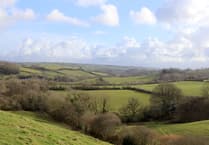A HUGE development of student and co-living rooms at Exeter’s former police station and magistrates’ court site has been overwhelmingly rejected by councillors, with one describing the plan as “hideous”.
The application for Heavitree Road, submitted by the police and crime commissioner’s office and its chosen developer Student Roost, was for two blocks of flats with more than 1,000 rooms.
They would have replaced the existing buildings opposite St Luke’s Campus, which have been unoccupied since the police moved to a new HQ at Middlemoor in 2020.
The main plan was for a purpose-built student accommodation (PBSA) building, with a separate co-living block available to the wider public consisting of 358 self-contained units.
But the vast majority of members on Exeter City Council’s planning committee rejected the scheme expressing concerns including the design, height and scale of the development, its close proximity to the road, a lack of amenities and the loss of trees and biodiversity.
During a lengthy presentation, Exeter’s director of city development Ian Collinson outlined the benefits of the application, claiming it makes the “best use” of the brownfield site.
He said it would provide “much needed housing in a very sustainable location” including 20 per cent affordable housing on the co-living element, and that there was a “presumption in favour” of such developments because the council lacks a five-year housing supply.
A revised plan in June reduced the scale to predominantly six storeys visible from street level, plus basement levels.
Mr Collinson said the “high density” was “appropriate in this strategic location” with the site virtually car-free apart from some disabled parking spaces – contributing to the city’s net zero 2030 plan and helping to house the city’s student population in purpose-built accommodation rather than in houses of multiple occupation.
Recommending approval, officers in their report said it would “deliver a number of substantial economic, social and environmentally sustainable benefits” such as by providing accommodation “likely to be in the price range of young people who can’t obtain a mortgage”.
However, most councillors, as well 114 public objectors who had written before the meeting, were unimpressed.
Cllr Moore also criticised the planned space and living standards, the lack of sufficient outdoor space, pedestrian safety on the nearby junction, and the loss of 25 out of 26 existing trees, though officers said some would be replaced.
She claimed “profits have been maximised at the cost of everything else”.
She said: “I urge members of the planning committee to hold high standards of housing for the people of Exeter, to protect our trees and green spaces, and to reject the proposed development.”
Speaking in support, Nicola Allen, treasurer for the police and crime commissioner’s office which owns the site, said a “robust process” was undertaken by the commissioner’s office, in partnership with the wider force and court service.
Local resident Geoff Tipping spoke against the plan. He said: “It is the scale, massing, height, and total loss of all existing habitat that is so wrong with this proposal.
“In short it is a greedy scheme that grabs every inch of the site and rises eight storeys above it.
“Circulation roads are pushed to the very edge.
“The visual impact on the neighbouring properties will be intolerable.
“The impact on Higher Summerlands is the most extreme.”
Councillor Anne Jobson (Conservative, St Loyes) described the co-living rooms as “simply too small” and that they would “adversely affect people’s wellbeing and mental health”.
“I think for the risk of allowing yet another development to go through is that it will just bring transient single people into the city and it will be driving local families and single residents out of the city,” she added.
Describing the plan as “hideous,” Cllr Marina Asvachin (Labour, Priory) said the proximity of the site to nearby hospitals meant it should be used instead for key worker housing.
But Cllr Zion Lights (Labour, Pennsylvania) supported the scheme because of the area’s housing shortage, explaining that she knows people “in the most dire circumstances” including a key worker from Crediton who commutes into Exeter but cannot find decent accommodation in the city.
Speaking towards the end of the meeting, council leader Phil Bialyk (Labour, Exwick) questioned whether the planning team could further engage with the applicant and developers on bringing forward a more acceptable scheme.
The vast majority of members voted to refuse permission.
The specific wording will be refined and formalised at the next meeting.
Ollie Heptinstall
LDRS




